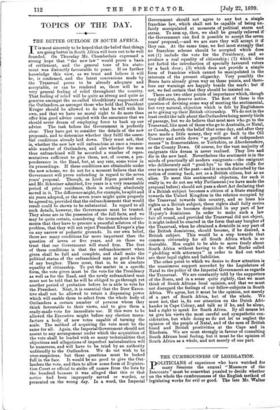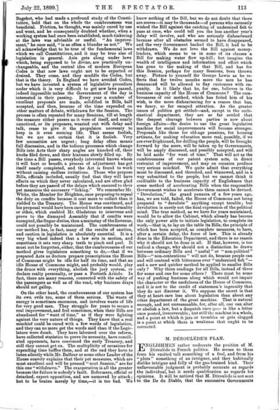THE CUMBROUSNESS OF LEGISLATION.
pOLITICIANS of experience who have watched for many Sessions the annual "Massacre of the Innocents" must be somewhat puzzled to decide whether on the whole the cumbrousness of the English method of legislating works for evil or good. The late Mr. Walter Bagehot, who had made a profound study of the Consti- tution, held that on the whole the cumbrousness was beneficial. Friction, he thought, was mainly cured by use and wont, and he consequently doubted whether, when a working system had once been established, much tinkering at the laws was advisable or useful. "An improve- ment," he once said, "is as often a blunder as not." We all acknowledge that to be true of the fundamental laws which we call Constitutions, and it may be true also of legislation in general. Asia gets along under laws which, being supposed to be divine, are practically un- changeable, and the central idea of modern European Codes is that new laws ought not to be expected or desired. They come, and they muddle the Codes, but that is the theory. In England we have avoided Codes, but we haie invented a system of legislative procedure under which it is very difficult to get new laws passed, indeed impossible unless the Government of the day is interested in their passing. Every year a number of excellent proposals are made, solidified in Bills, half accepted, and then, because of the time expended on other matters of debate, withdrawn for the Session. The process is often repeated for many Sessions, till at length the measure either passes as it were of itself, and nearly unnoticed, or its proposers, wearied out wit'h delay and talk, cease to give it the propulsion necessary to keep in it even seeming life. That seems foolish, but we are not certain that it is foolish. Very few necessities are urgent ; long delay often means full discussion, and in the tedious processes which change Bills into Acts their sharp angles are knocked off, their knobs filed down, and their hiatuses slowly filled up. By the time a Bill passes, everybody interested knows whom it will hurt or benefit, a process of adjustment has got itself nearly completed, and the Act is found to work without causing endless irritations. Those who propose Bills, officials included, usually find that they will have effects on which they never calculated, and are often glad before they are passed of the delays which ensured to their pet measures the necessary "licking." We remember Mr. • White, the Member for Brighton, once proposing to repeal the duty on comfits because it cost more to collect than it yielded to the Treasury. The House was convinced, and his proposal would have been carried but for some formality or other, which enabled Mr. Gladstone to intervene and prove to the dismayed Assembly that if comfits were exempted, the Sugar-duties, then a mainstay of the Revenue, could not possibly be maintained. The cumbrousness of our method has, in fact, many of the results of caution, and caution in legislation is absolutely essential. It is a very big wheel indeed that a law sets in motion, and sometimes it sets very sharp teeth to pinch and peel. It must not be forgotten, either, that the cumbrousness of our method gives legislators something to do,—that if we prepared Acts as doctors prepare prescriptions the House of Commons might be idle for half its time, and that an idle House of Commons might, and probably would, play the deuce with everything, abolish the jury system, or declare realty personalty, or pass a Fortieth Article. In fact, there are many reasons, connected with the safety of the passengers as well as of the road, why business drays should not gallop.
On the other hand, the cumbrousness of our system has its own evils too, some of them serious. The waste of energy is sometimes enormous, and involves waste of life for very good men. They struggle for years to secure a real improvement, and feel sometimes, when their Bills are abandoned for "want of time," as if they were fighting against the very nature of things. They know that a real mischief could be cured with a few words of legislation, and they can no more get the words said than if the Legis- lature were dumb. They have laboured over the reform, have collected statistics to prove its necessity, have concili- ated opponents, have convinced the surly Treasury, and still they cannot get on. The multiplicity of occasions for expending time baffles them, and at the end they have to listen silently while Mr. Balfour or some other Leader of the House suavely explains that their pet measures, which are most excellent and will be pressed "next Session," are for this one "withdrawn." The exasperation is all the greater because the failure is nobody's fault. Reformers, official or detached, expect opposition, and are unmoved by attack ; but to be beaten merely by time,—it is too bad. We know nothing of the Bill, but we do not doubt that there are scores—it may be thousands—of persons who earnestly wished the Bill against the catching of undersized fish to pass at once, who could tell you the loss another year's delay will involve, and who are seriously disheartened because after all obstacles seemed to have disappeared, and the very Government backed the Bill, it had to be withdrawn. We do not love the Bill against money- lenders, which seems to us in some of its clauses a Bill for making water flow up-hill; but imagine the wealth of intelligence and information and effort which has gone to the making of that Bill, and has for this Session, perhaps for many Sessions, been thrown away. Picture to yourself Sir George Lewis as he re- flects that for twelve months more the men he has denounced will be allowed to flay customers with im- punity. Is it likely that he, for one, believes in the business capacity of the House of Commons ? The cum- brousness of our method, which has foiled him of his wish, is the more disheartening for a reason that has, we fancy, so far escaped attention. As the greater issues of politics get settled—and, except in the eccle- siastical department, they are so far settled that the deepest cleavage between parties is now about foreign affairs—the desire to use the great legislative machine for social improvements will become stronger. Proposals like those for old-age pensions, for housing artisans, for making education more real, possibly, if we are ever frightened, for drilling the people, will be brought forward by the score, will be taken up by Governments, will be amply discussed, and possibly accepted, and will be laid aside "for want of time." That will act as the cumbrousness of our patent system acts, in direct restraint of improvement, and may on occasion produce very serious mischief. We quite admit that everything must be discussed, and threshed, and winnowed, and in a way submitted to the people, but we cannot think it creditable to the business capacity of Englishmen that some method of accelerating Bills when the responsible Government wishes to accelerate them cannot be devised. "Devolution," the grand panacea of a few years ago, has, we are told, failed, the House of Commons not being prepared to " devolute " anything except trouble ; but devolution is surely not the final expression of the political mind. The true method, as we have for years maintained, would be to allow the Cabinet, which already has become the only power able to initiate legislation, to complete its work,—that is, to lay on the table its Bills, the principle of which has been accepted, as complete measures, to have, after a certain delay, the force of law. This is already done in the Education Department, and there is no reason why it should not be done in all. If that, however, is too radical a change, why should not a distinction be drawn between ordinary Bills and " useful " or " non-political " Bills—" non-contentious" will not do, because people can and will contend with bitterness over "undersized fish "- and a new and quicker method be applied to smaller Bills only ? Why three readings for all Bills, instead of three for some and one for some others ? There must be some way of pushing business along which would not impair the character or the usefulness of the House of Commons, and it is not to the credit of statesmen's ingenuity that they do not discover it. We suppose the secret is that they at heart care less about legislation than about any other department of the great machine. That is natural enough, and not unreasonable, for, after all, one can alter or abolish a law, but a despatch once gout is like a letter once posted, irrecoverable ; but still the machine is a whole, and a point at which it jars or trembles or gets clogged is a point at which there is weakness that ought to be corrected.



































 Previous page
Previous page